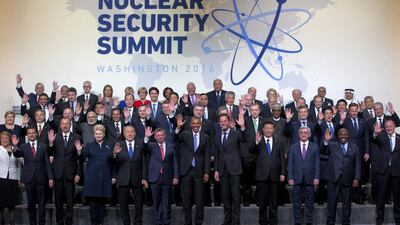Washington // More cooperation is needed to prevent ISIL and other extremists from getting a nuclear weapon, US president Barack Obama warned on Friday as global leaders met in Washington.
The threat of terrorists of using nuclear material in a “dirty bomb” – or even obtaining an atomic weapon – has loomed large over the Nuclear Security Summit, coming soon after revelations that ISIL members tracked the movements of a Belgian nuclear scientist.
“ISIL has already used chemical weapons, including mustard gas, in Syria and Iraq,” Mr Obama said.
“There is no doubt that if these madmen ever got their hands on a nuclear bomb or nuclear material, they most certainly would use it to continue to kill as many innocent people as possible.”
The summit, attended by dozens of world leaders and delegates, is focused on securing global stockpiles of nuclear materials, much of it used in the medical and power industries.
The UAE delegation was led by Sheikh Abdullah bin Zayed, Minister of Foreign Affairs, and included Yousef Al Otaiba, ambassador to the US, and Hamad Ali Al Kaabi, the country’s permanent representative to the International Atomic Energy Agency.
Mr Obama said about 2,000 tonnes of nuclear materials were stored around the world at civilian and military facilities, some of them not properly secured.
“Just the smallest amount of plutonium – about the size of an apple – would kill and injure hundreds of thousands of innocent people,” he said.
“It would be a humanitarian, political, economic and environmental catastrophe with global ramifications for decades.”
The nuclear security summit comes in the wake of attacks in Paris and Brussels that have killed dozens and exposed Europe’s inability to foil such plots or track ISIL operatives returning from Iraq and Syria.
Evidence that individuals linked to the attacks filmed a senior scientist at a Belgian nuclear facility has added weight to the nuclear threat.
Though the summit is focused on fissile stockpiles, other nuclear concerns have drawn broad attention, including North Korea and its continued testing of nuclear devices and ballistic missiles.
North Korea fired another short-range missile off its east coast on Friday, the latest in a series of missile launches during what has been an extended period of military tension on the Korean peninsula.
In January, North Korea detonated a nuclear device, its fourth such test, and a month later launched a long-range rocket.
The summit opened on Thursday with Mr Obama trying to forge consensus among East Asian leaders on how to respond to Pyongyang.
“We are united in our efforts to deter and defend against North Korean provocations,” Mr Obama said after meeting Japanese prime minister Shinzo Abe and South Korean president Park Geun-hye.
Halfway through the closing day of the fourth biennial summit, delegates described a series of incremental measures, such as enhanced cooperation between nations.
Leaders were expected to later adopt a final communique and action plans of the 52 participating countries to ensure the continuation of international efforts in the field of nuclear security.
The UAE, which is building its first nuclear reactor, is a party to all relevant international nuclear security conventions and cooperates closely with the IAEA on nuclear security.
It has developed a strict system to monitor and control the export and supply of nuclear materials and, since the previous summit in The Hague, has developed guides for their secure transport. It will also host an IAEA team this year to review the security for its nuclear plant.
The Federal Authority for Nuclear Regulation has drawn up a legislative framework to strengthen the security of radioactive materials in the country in line with IAEA regulations.
* Agence France-Presse and Wam

